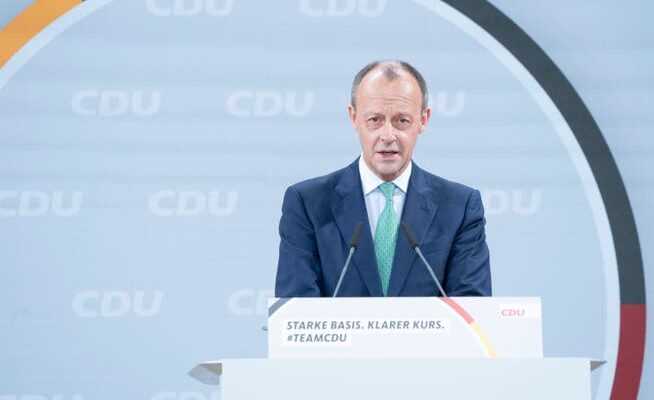Almost 95 percent of the delegates at the party conference of the CDU voted for Friedrich Merz as the new chairman. He wants to steer the party into conservative waters and could thus become the most important opponent of the traffic light government.
Friedrich Merz at the 34th party conference of the CDU in the Berlin party headquarters.
Friedrich Merz didn’t wait long before launching a frontal attack. At the virtual party conference of the CDU on Saturday in Berlin, he quickly came to speak of German Chancellor Olaf Scholz. It is now the most important task of the CDU to “challenge this Chancellor,” said the new head of the CDU, who has now also been confirmed by the party conference. Because of the strong inflation, the Germans are afraid of savings, pensions and income. Scholz has no answers to this.
Despite the danger of war in Ukraine, the German public does not find out whether the chancellor is speaking to the American or the Russian president, Merz said. However, all his predecessors would have taken the initiative in such a situation. Merz’ edgy speech was well received by the delegates. With 94.6 percent of the vote, they elected him the new party leader.
The 1001 delegates thus followed the will of the party members. In December, they voted with almost two-thirds of the votes for Merz as the new leader of the Christian Democrats. In doing so, he prevailed against foreign politician Norbert Röttgen and former Chancellor Helge Braun, who did not compete on Saturday. Merz’ election still has to be confirmed by letter vote, but this is considered a mere formality.
Merz actually wanted a lot more
The new CDU leader accepted the strong result with emotion and his supporters celebrated. “Even we, as his biggest supporters, didn’t expect that,” wrote the CDU member of the Bundestag Jana Schimke on Twitter. For the 66-year-old Merz it was the third attempt in the fight for the presidency of the Christian Democrats. In 2018 he narrowly lost to Annegret Kramp-Karrenbauer, a year ago he had to admit defeat to Armin Laschet. Laschet will lead the party until Merz’ is formally confirmed at the end of January.
Now Merz has what he wants – but he actually wanted a lot more. Normally, a CDU leader becomes the Union’s candidate for chancellor and has the best chance of the most important office in the state. Since the defeat in the elections in autumn, however, the CDU and CSU coalition has been in the opposition and has not yet acclimatised. The Union faction seems unsorted, a course is hardly recognizable.
In his speech on Saturday, Merz left little doubt as to how he wanted to align the CDU. Should he be able to assert himself, the path leads back to the roots of the party, which were hardly watered in the second half of the Merkel era. «We stand on a solid foundation and do not follow the zeitgeist. We defend civil society, the family and freedom of expression, »said Merz at the party conference.
The CDU as opposition to the zeitgeist
The opposition to the zeitgeist and the commitment to bourgeois values used to be formative for the CDU. Both are conservative core virtues. In Germany, however, the term conservative is so contaminated that even conservatives avoid it. Merz did say the word, but in the very next sentence he referred to the Mainz historian Andreas Rödder and his credo that conservative thinking is the protective mechanism against “dogmatism and absoluteness”.
Conservatism as a remedy against rampant ideologies such as gender language or cultural relativism: With this attitude, Merz could position the CDU as a credible alternative to the traffic light government of the SPD, Greens and FDP. Merz sees forces at work in this alliance that demonstrate “almost unlimited faith in the state” and implement a “gigantic spending program”.
Comrades from East Berlin
His most important ally is likely to be the new CDU general secretary, Mario Czaja. With 92.9 percent, he received almost as good a result as Merz at the party conference. The East German member of the Bundestag comes from Berlin, where he won the Marzahn constituency in the federal elections in autumn, which had been in the hands of the Left Party for 30 years.
The 46-year-old’s success stood out all the more because the CDU had the worst result in its history with around 24 percent of the votes in last year’s federal election. For this reason, the party re-elected its entire leadership on Saturday. Future deputy party leaders are Carsten Linnemann, Andreas Jung, Michael Kretschmer and Karin Prien. The only deputy not elected to the board for the first time is Silvia Breher.
It will soon become clear how the new top performs. Three state elections are scheduled for spring: in North Rhine-Westphalia, Saarland and Schleswig-Holstein. The CDU is still in government in all of these federal states. According to the surveys, it is uncertain whether this will remain the case. The only thing that is certain is that the state elections will be the first test to see whether Merz could lead the CDU back to the Chancellery.
